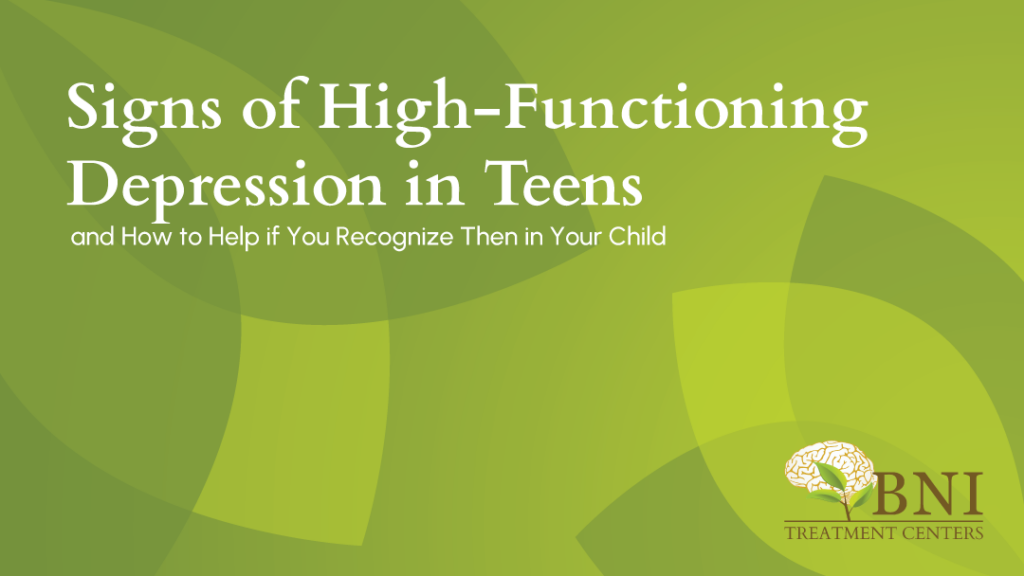Nearly 15% of California teens reported experiencing a major depressive episode in 2022. The number of teens living with depression is likely higher because many …
Signs of High-Functioning Depression in Teens and How to Help if You Recognize Them in Your Child

Nearly 15% of California teens reported experiencing a major depressive episode in 2022. The number of teens living with depression is likely higher because many don’t share the depth of their mental health concerns with others. Some may not seem depressed at all. They may have “high-functioning depression.”
High-functioning depression is significantly more difficult to recognize than typical depression due to its more “hidden” nature. What are the signs of high-functioning depression? We’re trained to recognize and treat all types of depression at BNI Treatment Centers. We’ll share what we know so you can identify this condition and help the teens in your life.
What Is High-Functioning Depression? Is It a Clinical Diagnosis?
A teen who can successfully lead their life despite their depression may have high-functioning depression. This is not clinical terminology, but is a memorable way to describe depression that still allows teens to carry out their responsibilities and regular activities. Teens with this type of depression may be diagnosed with persistent depressive disorder, which is characterized by chronic depression without major depressive episodes. High-functioning depression has an earlier age of onset than major depressive disorder, which is what most people think of as “traditional depression.”
A teen with traditional depression may not have the energy to get out of bed every day, causing them to be late to school frequently. A teen with high-functioning depression will get out of bed and make it to school on time, but may go through every day feeling deeply sad or emotionally numb.
High-functioning depression is not less significant than depression that manifests more obviously. Teens with this condition are less likely to seek help and are at risk of long-term complications due to the condition’s consistency. Suicide risk is 7.2 times higher in those with persistent depressive disorder than in those without depression.

10 Signs Your Teen Is Living With High-Functioning Depression
It is challenging to recognize high-functioning depression, but there are signs. Look for these symptoms in your child:
- Feelings of sadness and hopelessness
- Lack of interest in hobbies and activities
- Sleep complications
- Low self-esteem
- Trouble concentrating
- Changes in eating habits
- Fatigue
- Irritability
- Headaches and stomach aches
- Activities seem to take more effort
If these symptoms manifest in your child, seeking mental health care for them is vital. They can only receive a diagnosis from a clinician, and they will guide you on how to pursue treatment.
How to Talk to Your Teen About High-Functioning Depression
If your teen has high-functioning depression, they likely won’t approach you about it first. Look for the signs above, and if you spot them, have a conversation with your child.
Let them know what you noticed and that you’re concerned, and ask them if they’re feeling alright. For example: “I’ve noticed you’ve been eating less and are more tired lately, and it concerns me a little. I wanted to check on you. Are you feeling okay?” Listen to anything they share, and tell them you’re there if they want to talk or need extra support. It may be helpful to assure them that mental health symptoms are just as significant as physical health symptoms and that they don’t need to feel guilty for their depression. They’re more likely to open up if they don’t fear judgment or that their feelings will be dismissed or overlooked.
How to Help Your Teen Manage High-Functioning Depression: Next Steps
Even though your teen can adequately carry out their life with high-functioning depression, that doesn’t mean they should. If you believe they have high-functioning depression, getting help from a mental health professional is the best step to take. Cognitive behavioral therapy (CBT) can significantly improve depression, and there are additional treatment modalities that may be even more effective for your child. A mental health professional will recommend a combination of psychotherapy and medication that fits your child’s needs. Research indicates that utilizing both simultaneously may be more effective than either individually.
You can support your child by ensuring they know you’re there to talk and listen if needed. Encourage them to participate in hobbies, stay socially engaged, and suggest activities you can do together. Maintaining a consistent schedule and ensuring they receive adequate sleep is also beneficial. If they are in therapy, hold them accountable and make sure they complete any “homework” their therapist gives them. Keep in mind that high-functioning depression is painful even if it doesn’t seem like it. Be as patient and understanding as possible.

Finding Teen Depression Treatment in Los Angeles
Your teen might feel hopeless due to their depression. High-functioning depression can be especially persistent and tiring. Know that depression treatment – and hope – is within reach. There are many options available to your teen to improve their condition and empower them to achieve consistent contentment instead of sadness. They can find success and joy.
BNI Treatment Centers provides mental health services to teens in the Los Angeles area. Psychiatrists and other experts are closely involved in every teen’s treatment, ensuring they receive top-of-the-line care that addresses every aspect of their well-being. No condition or situation is too complex for BNI. If your child is living with high-functioning depression or any other mental health concerns, we want to help. Call (888) 522-1504 to get started.
BNI Treatment Centers: Science-based, evidence-backed, compassion-led.




